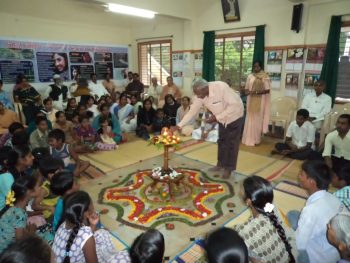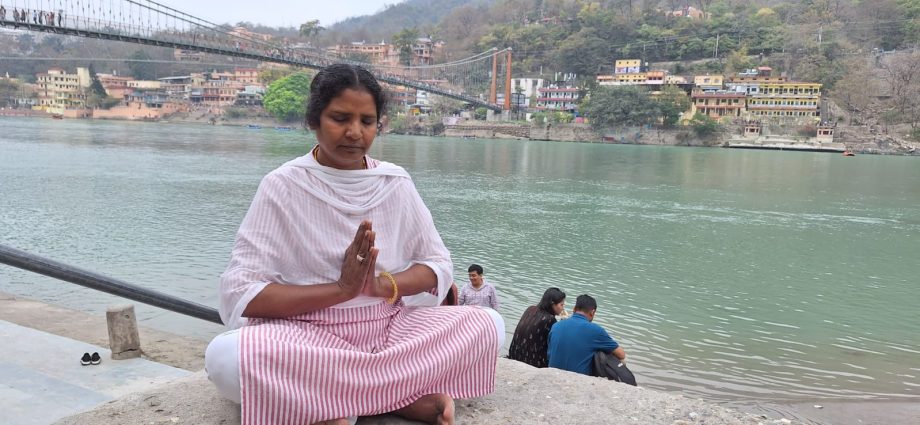By Sujata Jena
Bhubaneswar, April 24, 2024: An ashram started by a group of nuns in southern Indian town has completed 25 years promoting interfaith harmony.
The Franciscan Missionaries of Mary congregation founded the Ishalaya Ashram in 2000 at Palamaner in Andhra Pradesh state in response to the Second Vatican Council’s recommendation to reach out to people of other faiths.
The ashram was an answer to the congregation’s 1978 General Chapter that called for integrating intercultural elements into the Franciscan spirituality, says Sister Vimala Varapragasam, the vice president of the National Ashram Aikya, an association Catholic priests and nuns who have opted to live like hermits.
She recounted how in the 1980’s her congregation engaged in interfaith dialogue meetings to proclaim Christ’s uniqueness and universality amid diverse faiths.
Strengthening this dialogue, they immersed in local communities, learning customs and traditions, and fostering communal harmony. Mobilizing children and women, they imparted values promoting self-confidence, neighborliness, sharing, and cleanliness, Sister Vimala explained.
Through this, the nuns embraced a simpler life and experienced the warm hospitality from those they served, said the nun, who has lived in the ashram for more than a decade.
“My inspiration stems from the words of our founder, Blessed Mary of the Passion: ‘Be like the little sanctuary lamp that burns itself quietly,” she told Matters India.
 She said she did not choose the religious life to become a teacher, accountant, or administrator. “Rather, my calling is to dwell in the presence of the Lord and to serve His people—individuals of goodwill from all faiths,” she added.
She said she did not choose the religious life to become a teacher, accountant, or administrator. “Rather, my calling is to dwell in the presence of the Lord and to serve His people—individuals of goodwill from all faiths,” she added.
Describing the ashram routine, she said they begin the day with an arati salutation to God, followed by chanting, meditation, prayer, and Eucharistic celebration.
Arti is an India ritual in which light is waved in circles to venerate deities.
“Our karma yoga involves tasks such as cleaning, washing, vegetable cutting, and cooking. Additionally, we engage in classes or personal sadhana as needed, which may include reading, praying, or meditating.”
The ashramites take vegetarian meals, often n silence. In the evening, they gather for satsang, prayer with songs in a group.
“We continuously engage in nama japa [the recitation of God’s name], our ishtadevta, to cultivate a state of Christ-consciousness in our daily lives,” explained Sister Vimala, an expert in Indian Classical music.
On her part, she tries to spread the teachings of Saint Francis Assisi, a twelfth century Italian mystic who promoted universal brotherhood through dialogue with various cultures and religions. The Catholic saint spread the message of the Son of God though the spirituality of the Crib, depicting the humble, lowly, and quiet birth of Jesus.
“Ishalaya is a home for all religions and a treasure house of prayer, peace and serenity,” Sister Vimala said.
Those who have lived in the ashram out of interest have found meaning in this mission, she said. “They have expressed that they were able to live in conscious mindfulness, practice ahimsa (Non-Violence).”
In Ishalaya, the nuns guide people to delve deeply into themselves, and discover the fundamental purpose of their existence. “This journey leads them to care not only their fellow beings but the environment.”
India has 50 Catholic ashrams dedicated to prayer and spiritual experiences. They are organized by the wing of National Ashram Aikya. Ashramites opt for a modest lifestyle marked by austerity, adhere to vegetarianism, and wholeheartedly embrace people from all religious backgrounds, Sister Vimala explained.
Missionary Oblates of Mary Immaculate Father Chinnappan Susairaj, who has spent 12 year in Anmodaya Ashram, is the president, and Benedictine Father Diratik Rajan is the secretary. The ashramites selected them in 2022.

